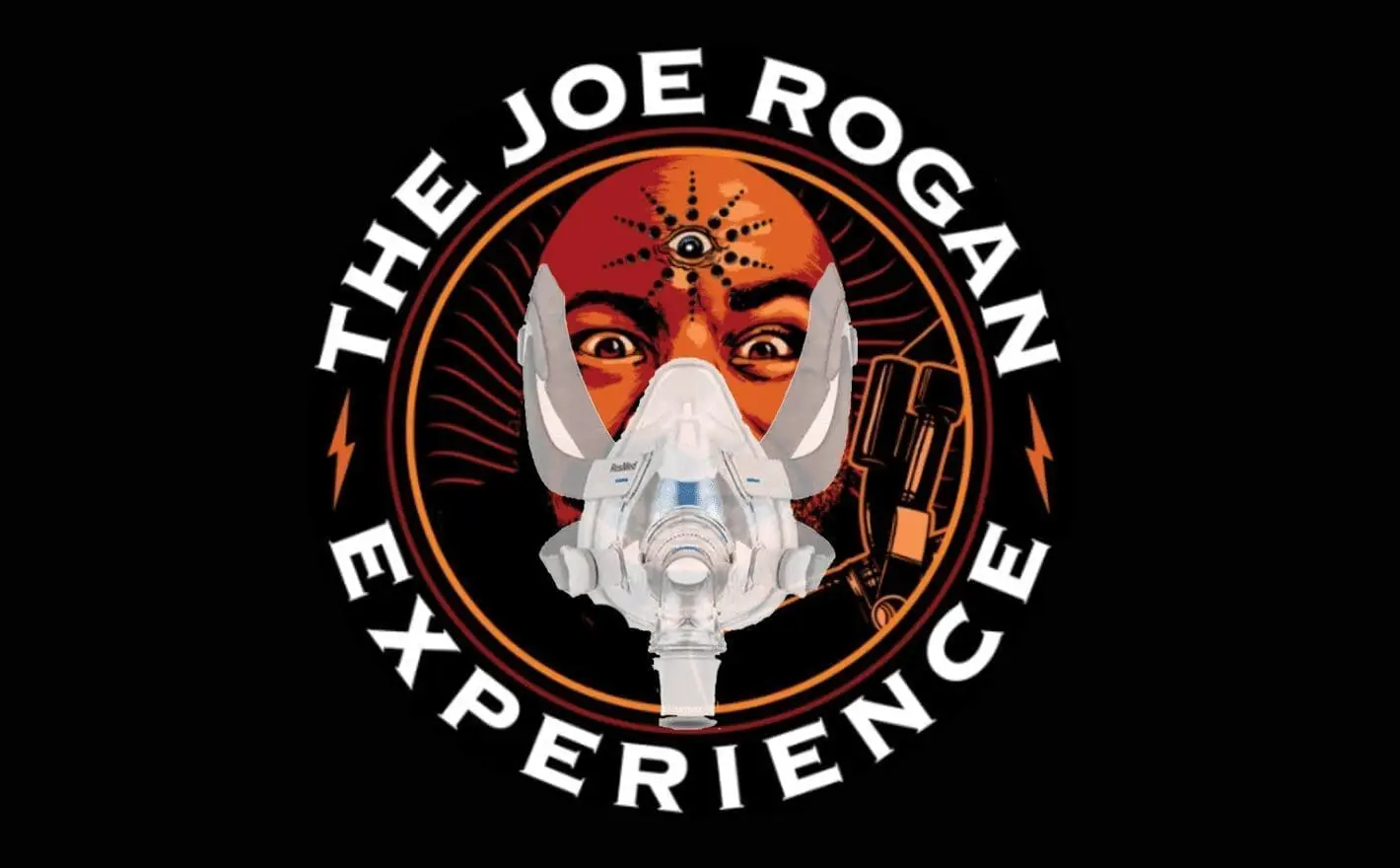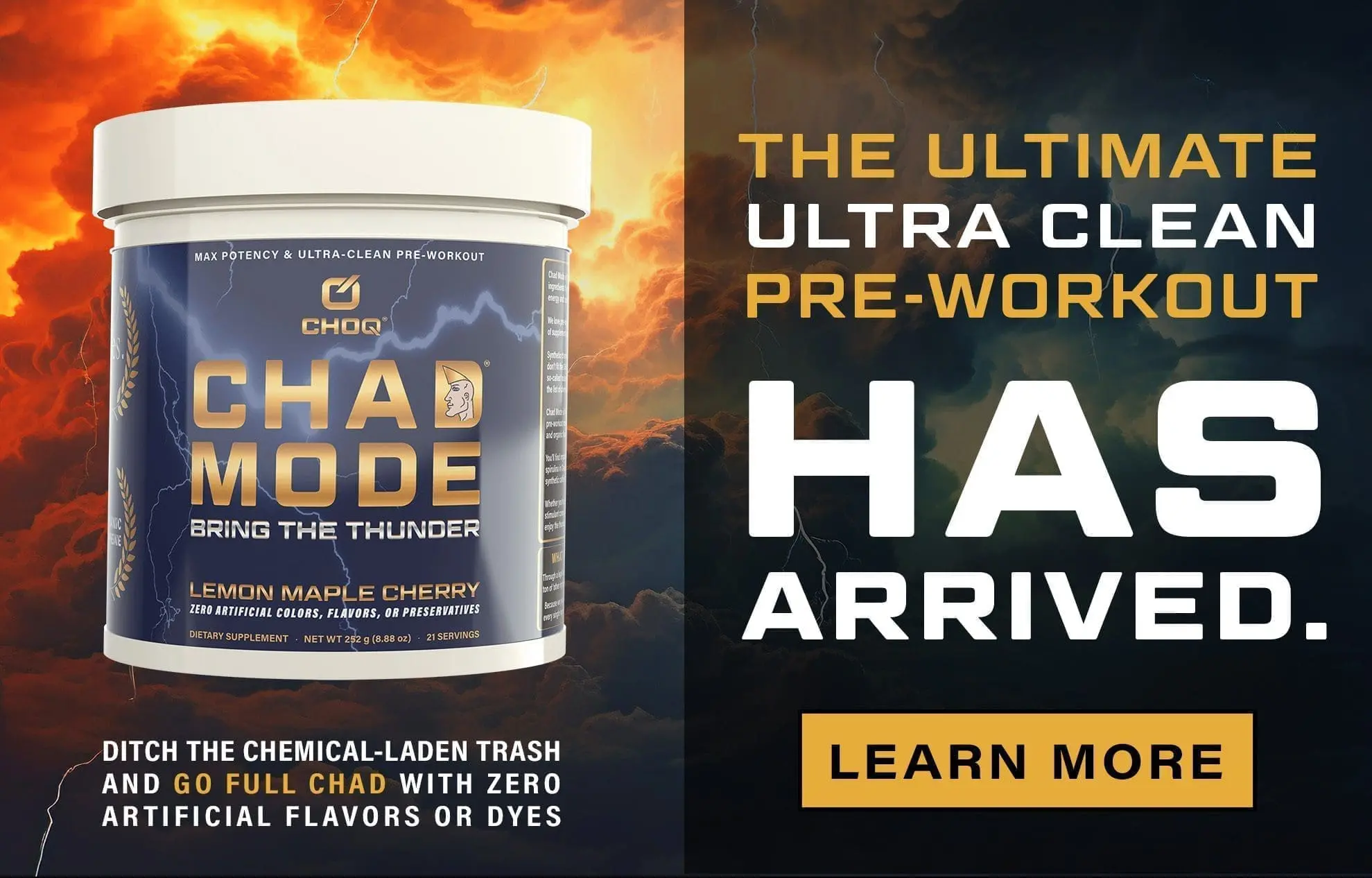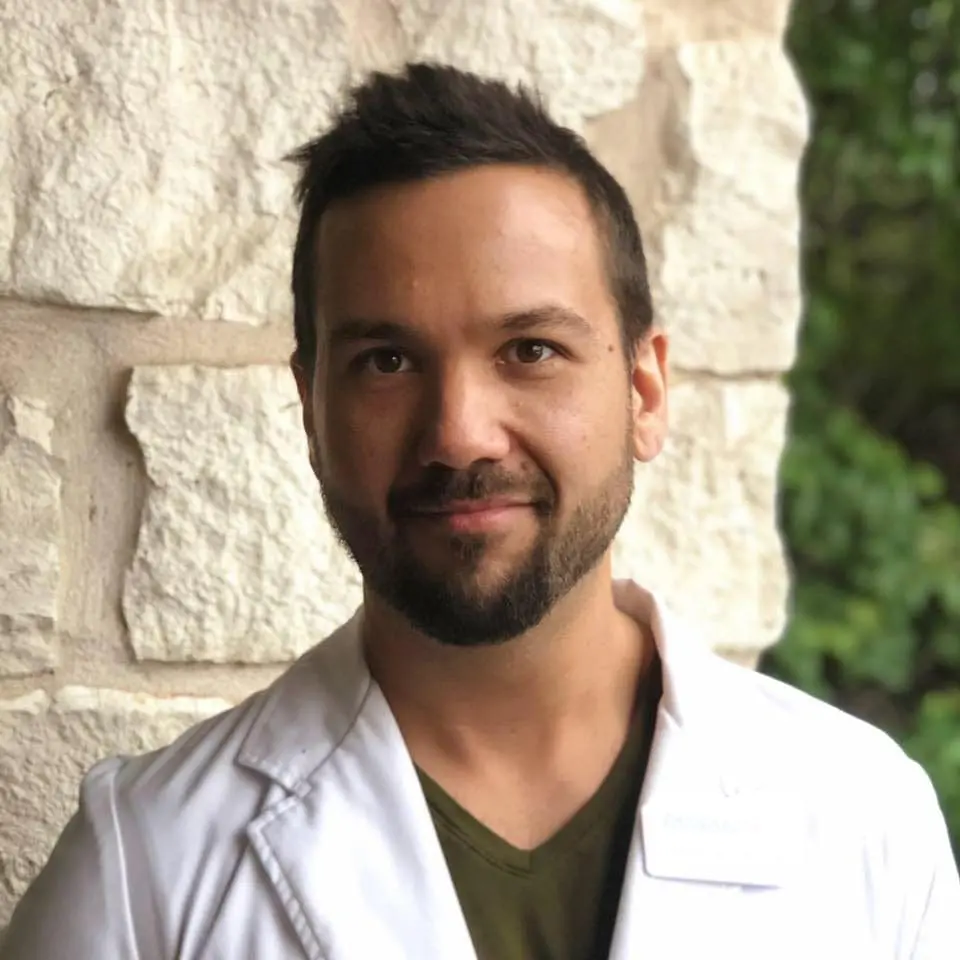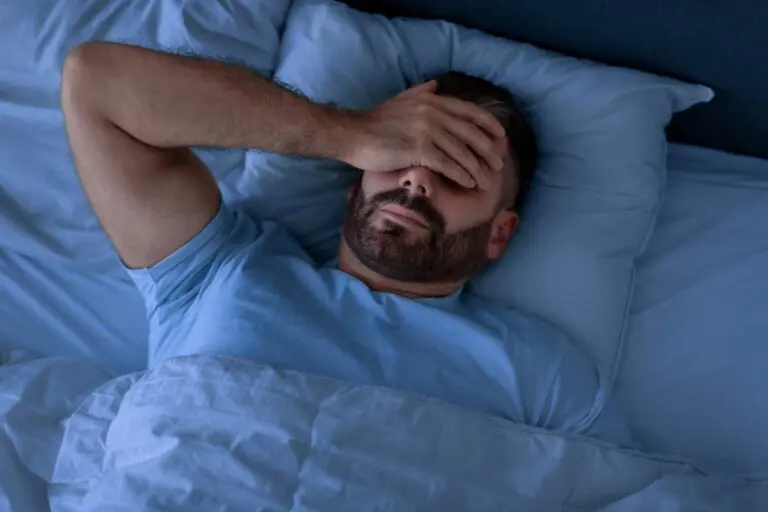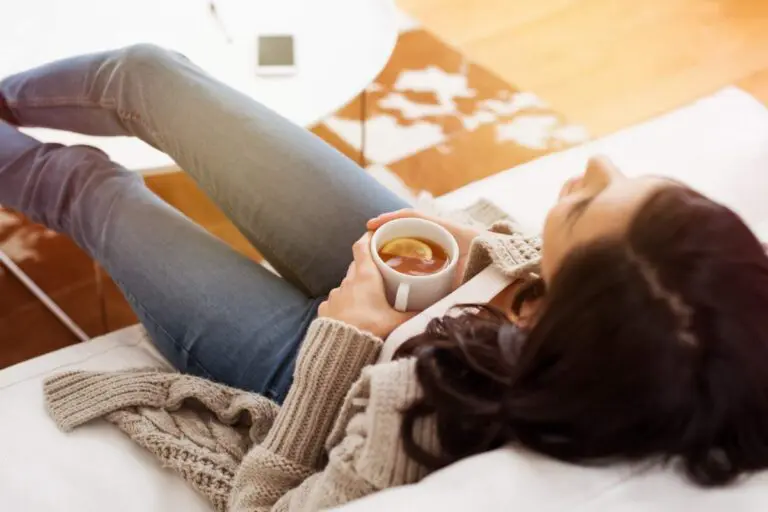Joe Rogan is the biggest podcaster in the world, so naturally anytime he recommends a product–such as his anti-snoring piece for sleep apnea–you’ll see thousands of searches pop up overnight like mushrooms after a good rain (which Joe’s known to be a big fan of).
Companies like Lofta and Vitalsleep naturally jumped at the chance to let potential customers know about Joe Rogan’s snoring remedy by sharing clips from his videos.
We of course don’t blame them. If Joe Rogan endorsed the CHOQ Male Vitality STAQ (our top seller)–or talked about the benefits of our patented, clinically studied Shilajit–you can be sure we’d share those clips like crazy.
We’re talking about a medical treatment for a fairly serious issue, so we need to dig deeper. Not only does sleep apnea worsen cardiovascular disease, impair focus, and cause significant weight gain, but it can also lower your testosterone and even give you erectile dysfunction (more on that later).
If these mouthpieces work as Rogan and his doctor, Bryan Keropian suggest, then that’s good news for millions of people. They’re far cheaper and infinitely more user-friendly than CPAP machines, which over 50% of patients reject because they’re so unpleasant to deal with.
In this article, we ask: what does the research say about these simple mouthpieces, and how do they stack up to CPAPs? In addition to that, we’ll share some facts about sleep apnea and share some ways you can assess how likely it is that you have it.
We’ll also throw in some fun facts about the physiology of sleep and breathing, including wisdom from other podcasting giants like Dr. Andrew Huberman, to help educate you on how they interact.
Table of contents (click on links to go to each section)
- Understanding sleep apnea + dispelling its biggest myth
- CPAPs work well, but this is why so many people hate them
- What Rogan, Dr. Bryan Keropian, and Huberman say about sleep apnea + comparing the two kinds of mouthpieces
- What the research says about mouthpieces vs. CPAPs
- How sleep apnea causes erectile dysfunction
- Assessing sleep apnea risk & suggestions for supporting healthy sleep
Understanding sleep apnea + dispelling its biggest myth
Sleeping disorders can dramatically reduce your life expectancy, not to mention wreck havoc on your general health and quality of life. If you suspect you might have it, you should definitely talk to a doctor because fixing it could absolutely change your life.
Obstructive Sleep Apnea (OSA) is defined according to polysomnography, which records a variety of things while you sleep, including airflow, blood oxygen levels, brain waves, eye movement, and heart rate. Based on this data, your doctor will give you an AHI score (which stands for ‘Apnea Hypopnea Index’).
Here’s a list of all the issues that nighttime breathing interruptions can create or worsen:
- Weight gain
- Cardiovascular problems like high blood pressure
- Problems with focus & memory
- Low energy
- Autoimmune disease
- Frequent nighttime urination
- Morning headaches
- Low testosterone
- Erectile dysfunction
- Not to mention a very annoyed partner who can’t sleep because of your snoring
Sleep apnea & weight gain: chicken or egg?
We put ‘weight gain’ at the top of the symptom list because it involves one of the top myths about sleep apnea: that weight gain is the biggest cause of it. Turns out that’s not quite true.
In fact, the relationship between weight gain and sleep apnea has more to do with it causing obesity, versus the other way around.
Sleep specialist Dr. Vick Veer did a study that looked at over 2,100 sleep apnea patients, and found that far fewer of them are overweight than many think. Here’s a graph that plots BMI (Body Mass Index) and AHI, a measurement of sleep apnea severity:
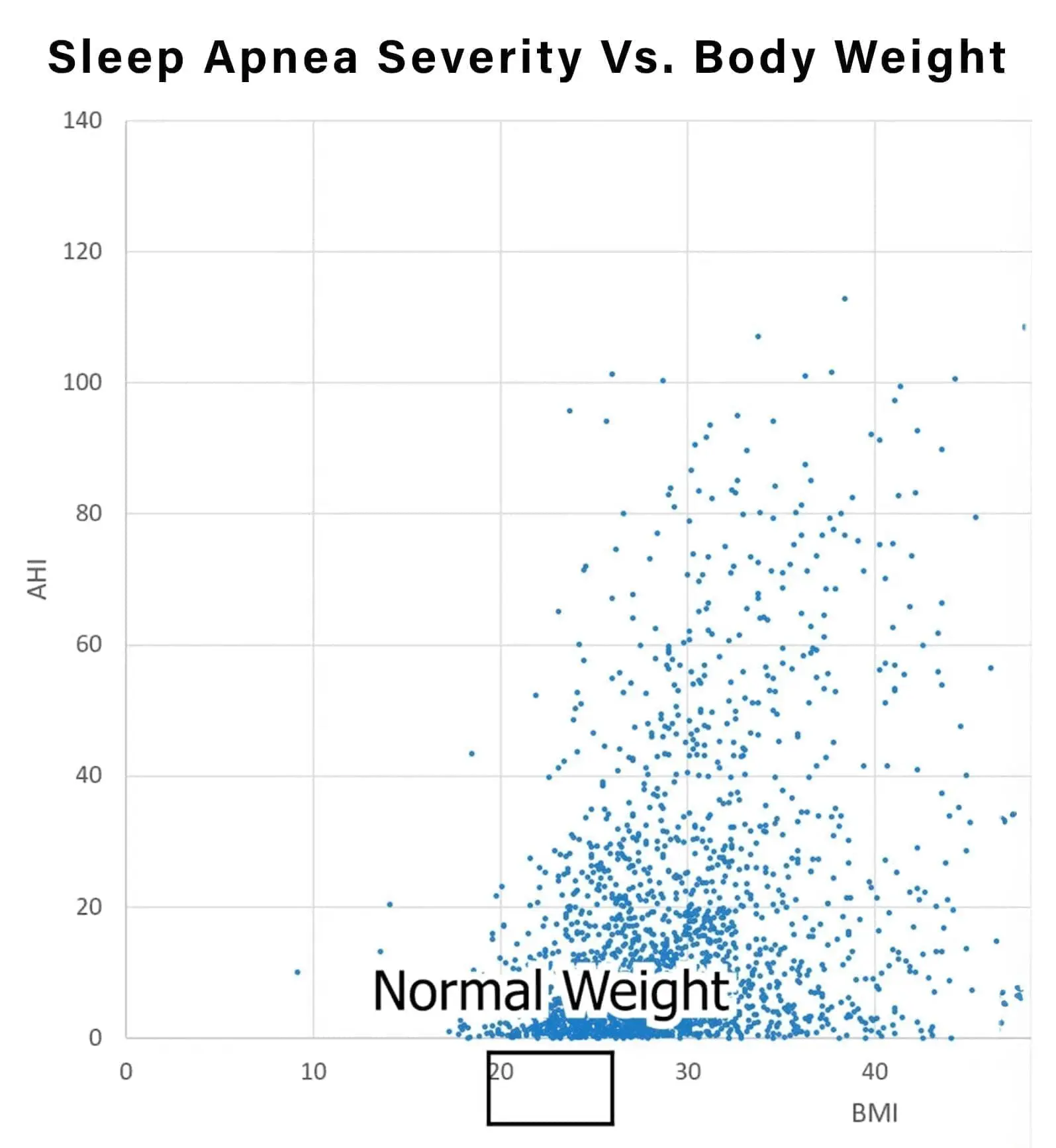
BMI below 25 is normal, 25-30 is overweight, and over 30 is obese. Notice how many dots are still in the normal weight zone. In one video, Dr. Veer says that the actual correlation between sleep apnea severity and weight was calculated to be about 0.34, which is considered weak.
He mentions that apnea can affect a variety of hormones in a way that increases appetite and fat storage, including leptin, grhelin, adiponectin, and others. He also remarks that a fair number of patients immediately begin to lose weight after their sleep apnea has been treated, without even trying to change their diet or exercise habits.
CPAPs work well, but this is why so many people hate them
Many people can’t stand CPAPs to the point that they refuse to use them, so it’s extremely easy to see why people like Joe Rogan and millions of others with sleep apnea would want to switch to a mouthpiece. CPAP stands for “Continuous Positive Airway Pressure’, and the only way to achieve that is to wear a mask.
Aside from the complaint of ‘this is super uncomfortable and makes me look like a creepy cyborg’, other common gripes include:
- It’s too loud and I already have enough sleep problems
- It hurts my nasal passages
- It might give me a sinus infection (or worse) if I forget to clean it all the time
- It irritates my skin and make me break out
- My spouse hates it and it scares my children
Inconvenient as they are though, CPAPs are still considered the gold standard treatment and help millions of people.
It’s also important to understand just how big of an issue sleep apnea is…probably a lot bigger than many folks might think. According to the National Council on Aging, sleep apnea:
- Affects almost 40 million people just in the US
- Is estimated to impact over 15% of the world’s adult population
- Can contribute to an array of health issues, including heart, kidney, and metabolic problems like diabetes
It’s clear that people wouldn’t use these noisy, inconvenient machines are if they weren’t helping them dramatically. That being said, it’s only natural that Rogan and huge numbers of sleep apnea sufferers would be searching for a more user-friendly alternative.
What Rogan, Dr. Bryan Keropian, and Huberman say about sleep apnea + comparing the two kinds of mouthpieces
Joe Rogan’s sleep apnea fix has been discussed a few times on JRE, but usually only briefly. In this video, he says that he says that his mouthpiece has “made a world of difference.” In other videos, Rogan has commented on how his large neck muscles have worsened his condition, and also talked a little about Dr. Bryan Keropian, the dentist he uses for his custom-fitted snoring remedy.
Dr. Keropian refers to Joe Rogan’s anti-snoring mouthpiece as the ‘Full Breath Solution’. According to his website, he has advanced training in the treatment of head, neck, and jaw pain and has personally developed his own protocols to treat snoring and sleep apnea. Dr. Keropian says his device helps with regular snoring and can be used for either minor or moderate sleep apnea (which means your AHI is under 30).
From the looks of it, his mouthpiece design is somewhat unique, but probably closer to a ‘MAD’ than the other kind of mouthpiece, called a ‘TRD’.
Two kinds of sleep apnea mouthpieces: MADs Vs. TRDs
There are two main kinds of mouthpieces for sleep apnea: Mandibular Advancement Devices (MADs) and Tongue-Retaining Devices (TRDs). Because Rogan is going to a dentist to get a custom-fitted one, it seems like he’s probably using a MAD to improve his sleep quality.
That’s because that’s one of the main differences between the two. Here’s a list of some other differences.
Pros & Cons of MADs
- Help with teeth grinding and clenching
- Require custom fitting and can be adjusted
- Often considered more effective than TRDs
- Cannot be used with dentures
- More expensive than TRDs
Pros & Cons of TRDs
- Not as helpful for grinding and clenching
- Don’t require custom fitting
- Usually not adjustable
- Work with dentures
- May be slightly less effective than MADs
- Less expensive than MADs
Insights from Dr. Andrew Huberman: why nose breathing is so important
In his video titled “How to Breathe Correctly for Optimal Health, Mood, Learning & Performance,” Dr. Huberman shares a ton of great information–including breathing techniques for relaxation, essential breathing physiology, and Wim Hof–but he also covers sleep apnea and why nose breathing is superior to mouth breathing (link is time-stamped to go to that exact part).
Here are a few highlights from Huberman’s video:
- Medical tape that seals your mouth shut is a great way to reduce sleep apnea for some, and helps train the body to breathe more through the nose in general
- Breathing through the nose increases circulation by boosting nitric oxide
- Breathing more from your nose during the day can also train your body to do the same when you’re sleeping
- Your breathing profoundly affects your blood pH
- He also talks extensively about various breathing techniques, so be sure to check it out if you’re interested in that sort of thing
Out of all the quotes from the video, this one was the most interesting:
“The brain, by regulating breathing, controls its own excitability.”
This quote was directly from a paper Huberman discussed called, “Concentration of carbon dioxide, interstitial pH and synaptic transmission in hippocampal formation of the rat.” If you watch his video or read the paper, you’ll understand why breathing techniques can be so incredibly effective for anxiety.
He also gives a brief overview of the video, lists timestamps, and shares a variety of relevant scientific articles on his website. Overall, we thought it was a great video with lots of helpful information. Huberman also talks about sleep and the brain on the Joe Rogan Experience Podcast.
What the research says about mouthpieces vs. CPAPs
If you want to end your battle with sleep apnea, you have multiple options, but doctors will still usually recommend a CPAP.
According to research these mouthpieces do seem to be fairly helpful as long as you don’t have severe sleep apnea, though. This 2023 review of sleep apnea research included a total of 19 different studies, 6 of which were RCTs (Randomized Controlled Trials).
The authors of the paper state:
“…six RCTs found favorable evidence for OSA patients receiving oral devices; however, they were less effective than CPAP. A subgroup analysis found that MAD may be a beneficial treatment for mild to moderate OSA patients who do not respond to CPAP. The findings suggest that oral appliances may be an effective treatment for OSA, especially in patients with mild to moderate OSA.”
While the authors did not state outright whether MADs like Joe Rogan’s mouthpiece are superior to TRDs, they do say that one study showed they were fairly comparable.
A study that compared the two, however, concluded that MADs were better according to official measurements from the polysomnography device, but that both had similar improvements for quality of life and reduced daytime sleepiness.
How sleep apnea causes erectile dysfunction
Your partner might be affected by your sleep apnea for reasons that have nothing to do with snoring.
In this very scary interview with a sleep specialist, he injects a little levity by saying that “the two fastest ways to get a man to see the doctor are an ambulance and erectile problems.” As with so many things, it’s funny because it’s true.
When you think about it, it makes perfect sense. Reduced oxygen impairs circulation, so of course sleep apnea would cause this issue. In an article called “Erectile Dysfunction and Obstructive Sleep Apnea: a Review,” the authors reviewed over 30 papers, stating:
“A cascade of vascular and inflammatory events is activated by intermittent hypoxic events, including downregulation of circulating nitric oxide (NO) levels…In the physiology of erection, NO is a crucial transmitter. A decrease in circulating NO levels may also contribute to diminishing nocturnal penile tumescence”
(Note that ‘nocturnal penile tumescence’ is a very complicated medical term for what’s usually referred to as ‘morning wood’.)
Assessing sleep apnea risk & suggestions for supporting healthy sleep
Although you can’t know for sure until you talk to a doctor and do an official sleep study, there are a couple ways you can start your investigation now.
One way is to take this quick, 8-question quiz. It will tell you your risk based on how you answer.
Another way is to use a phone app called ‘Snorelab’ to record and quantify your snoring. It’s available for both Android and iOS and has a free one-week trial.
Other suggestions to boost sleep health
Even though none of these things treat sleep apnea, they can all promote healthy sleep. Here are our top suggestions:
- Practice good sleep hygiene (see this link for more info)
- Do breathing exercises like the 4-7-8 technique to calm your nervous system before bed
- Avoid bright and especially blue light like the plague: dim home lights, use night shift on your devices, and consider getting blue blocking glasses to use at night
- Do anything you can to reduce stress
- Take Ashwagandha & Tongkat Ali
- Get bright light exposure and exercise more during the day
Both Ashwagandha & Tongkat have been shown in research to support healthy sleep. CHOQ Ashwagandha, which has the highest concentrations of withanolides of any product on the market, is excellent for reducing stress hormones and increasing sleep quality. We go into that research and tons of other studies in this article.
The patented extract in CHOQ Tongkat 100, which has been subject to over 20 different clinical studies, has also been shown to improve stress hormones, sleep quality, and significantly improve testosterone and energy levels.
Both of these products (as well as CHOQ Daily) are in our top-selling Male Vitality STAQ, which thousands of men use every day to decrease stress and boost their energy, vitality, and testosterone levels.
If you’d like to learn more about breathwork, adaptogens, and superfoods check out these articles:
